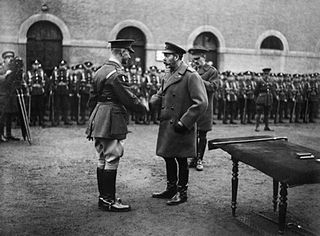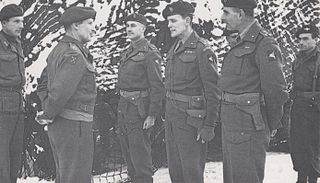 W
WLieutenant General Sir Colin Muir Barber & Bar was a senior British Army officer who fought in both World War I and World War II where he commanded the 15th (Scottish) Infantry Division during their actions across Northwest Europe, from August 1944 until Victory in Europe Day in May 1945. Barber was reputed to be the tallest officer in the British Army, and thus earned the ironic nickname "Tiny".
 W
WMajor-General John Barrington was an officer of the British Army, the third son of John Barrington, 1st Viscount Barrington.
 W
WColonel John Mount Batten, CB, JP was a British soldier and landowner.
 W
WEdward Felix Baxter VC was an English recipient of the Victoria Cross, the highest and most prestigious award for gallantry in the face of the enemy that can be awarded to British and Commonwealth forces.
 W
WMajor General Daniel Marcus William Beak, was a British Army officer and an English recipient of the Victoria Cross, the highest award for gallantry in the face of the enemy that can be awarded to British and Commonwealth forces.
 W
WJames FitzJames, 1st Duke of Berwick, 1st Duke of Liria and Jérica, 1st Duke of Fitz-James was an Anglo-French military leader, illegitimate son of King James II of England by Arabella Churchill, sister of the 1st Duke of Marlborough. Berwick was a successful general in the pay of Louis XIV of France.
 W
WMajor General Eric Louis Bols CB DSO & Bar was a senior British Army officer, who, during World War II, was most notable for serving as the General Officer Commanding (GOC) 6th Airborne Division during Operation Varsity in March 1945.
 W
WMajor Cuthbert Bromley VC was an English recipient of the Victoria Cross, the highest and most prestigious award for gallantry in the face of the enemy that can be awarded to British and Commonwealth forces.
 W
WHoward Edward Bernard Cavanagh FRIBA was an English architect.
 W
WMajor Sir Benn Jack Brunel Cohen KBE was a British Conservative Party politician and campaigner on behalf of disabled people. He was Member of Parliament (MP) for Liverpool Fairfield from 13 years, from 1918 to 1931.
 W
WEdward Cornwallis was a British career military officer and was a member of the aristocratic Cornwallis family, who reached the rank of Lieutenant General. After Cornwallis fought in Scotland, putting down the Jacobite rebellion of 1745, he was appointed Groom of the Chamber for King George II. He was then made Governor of Nova Scotia (1749–1752), one of the colonies in North America, and assigned to establish the new town of Halifax, Nova Scotia. Later Cornwallis returned to London, where he was elected as MP for Westminster and married the niece of Robert Walpole, Great Britain's first Prime Minister. Cornwallis was next appointed as Governor of Gibraltar.
 W
WLieutenant-Colonel Donald Dickson Farmer VC MSM was a Scottish recipient of the Victoria Cross, the highest and most prestigious award for gallantry in the face of the enemy that can be awarded to British and Commonwealth forces.
 W
WRobert Shirley, 1st Earl Ferrers PC —known as Sir Robert Shirley, 7th Baronet, from 1669 to 1677 and Robert Shirley, 14th Baron Ferrers of Chartley, from 1677 to 1711—was an English peer and courtier.
 W
WJames Michael Christopher Fitzmaurice DFC was an Irish aviation pioneer. He was a member of the crew of the Bremen, which made the first successful trans-Atlantic aircraft flight from East to West on 12–13 April 1928.
 W
WGeneral Sir Edward Harris Greathed KCB was a British Army officer who became General Officer Commanding Eastern District.
 W
WGeneral Sir Charles Harington Harington, was a British Army officer most noted for his service during the First World War and the Chanak Crisis. During his 46 years in the army, Harington served in the Second Boer War, held various staff positions during the First World War, served as Deputy Chief of the Imperial General Staff between 1918 and 1920, commanded the occupation forces in the Black Sea and Turkey, and ultimately became Governor of Gibraltar in 1933.
 W
WKenneth Lotherington Hutchings was an English amateur cricketer who played for Kent County Cricket Club and the England cricket team between 1902 and 1912. He was primarily a batsman who played a major role in three of Kent's County Championship wins in the years before World War I and who played seven Test matches for England. He was chosen as one of Wisden's Cricketers of the Year in 1907. Hutchings was killed in action during the Battle of the Somme whilst serving with the King's Liverpool Regiment in 1916.
 W
WSir William Montagu Scott McMurdo was a British army officer who rose to the rank of general. He saw active service in India, helped to run a military railway in the Crimean War and then managed various groups of volunteers working with the army. He was eventually knighted.
 W
WColonel Wilfrid William Ashley, 1st Baron Mount Temple, PC was a British soldier and Conservative politician. He served as Minister of Transport between 1924 and 1929 under Stanley Baldwin.
 W
WEdgar Kinghorn Myles, was a British Army officer and a recipient of the Victoria Cross, the highest award for gallantry in the face of the enemy that can be awarded to British and Commonwealth forces.
 W
WBrigadier-General Herbert Cecil Potter, was a senior British military officer, 'Military Chief' of Belfast and Colonel Commandant of the 3rd Indian Infantry Brigade, Peshawar. A catalogue of Potter's papers described him as a 'quintessential member of the British officer class'.
 W
WMajor-General Frank William Ramsay was a senior British Army officer in the First World War.
 W
WOswald Austin Reid VC was a South African recipient of the Victoria Cross, the highest and most prestigious award for gallantry in the face of the enemy that can be awarded to British and Commonwealth forces.
 W
WJohn Richardson was a Canadian officer in the British Army who became the first Canadian-born novelist to achieve international recognition.
 W
WSir Charles George Douglas Roberts was a Canadian poet and prose writer. He was one of the first Canadian authors to be internationally known. He published various works on Canadian exploration and natural history, verse, travel books, and fiction." He continued to be a well-known "man of letters" until his death.
 W
WEdward Frederick Langley Russell, 2nd Baron Russell of Liverpool CBE, MC, known as Langley Russell, was a British soldier, lawyer, historian and writer.
 W
WGeneral Lord Alexander George Russell, was a British Army general. He served during the Siege of Sevastapol in the Crimean War.
 W
WHugh Stewart, was an academic, soldier and historian whose work had a major impact in both England and New Zealand.
 W
WGeneral Sir Alfred Dudley Ward,, commonly known as Sir Dudley Ward, was a senior British Army officer who saw distinguished active service during the Second World War and later became Governor of Gibraltar. Serving as an ordinary soldier for three years before being sent for officer training in 1926, slow peacetime career progression saw Ward achieving the rank of captain only in 1937. However, the Second World War, which began just two years later, allowed him to demonstrate his high ability as both a staff officer and a commander of troops in the field. Receiving command of the 4th Infantry Division at the unusually young age of 39 years and 3 months, he led the division in Italy and Greece from 1944 to 1945. After the war ended in 1945, Ward went on to hold several staff and field appointments at the highest levels, including Deputy Chief of the Imperial General Staff and Commander-in-Chief of the British Army of the Rhine, retiring as a full general in 1965.
 W
WDavid Watts Morgan,, who later in life hyphenated his name to Watts-Morgan, was a Welsh trade unionist, a Labour politician, and a Member of Parliament (MP) from 1918 to 1933.
 W
WLieutenant-Colonel Sir Henry ("Harry") Webb, 1st Baronet was a British Liberal Party politician who was Member of Parliament (MP) for Forest of Dean (1911–1918) and Cardiff East (1923–1924), and as Junior Lord of the Treasury (1912–1915).
 W
WEdward George Wynyard, DSO, OBE was a British Army officer and an English cricketer who played in 3 Tests from 1896 to 1906. He captained Hampshire County Cricket Club between 1896 and 1899.